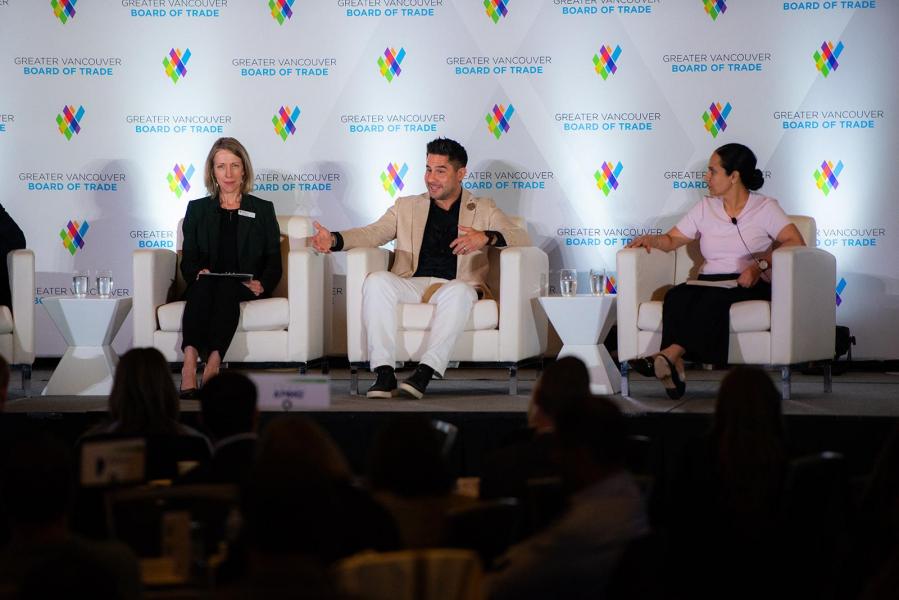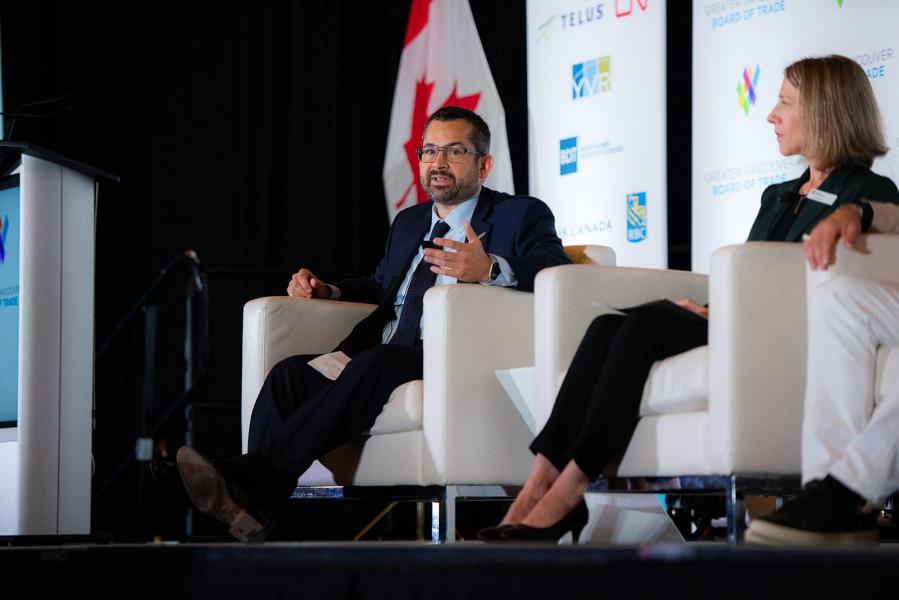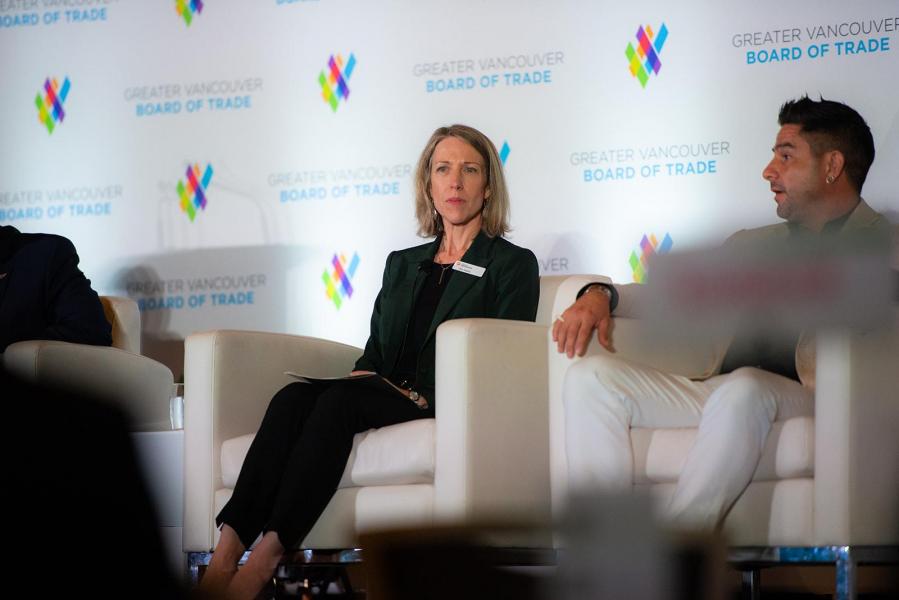From Education to Partnerships: How the Business Community can help propel Indigenous-led Prosperity

Indigenous owned businesses contribute nearly $50 billion to Canada’s economy annually, and in B.C., the First Nations economy was estimated to have generated a total GDP of about $7.4 billion in 2021, or about 2.6% of total BC GDP.
However, achieving prosperity, self-determination, and self-owned income generation as a First Nation or Indigenous person in the business world is no easy feat. It takes courage, government and industry advocacy, and partnership building.
The Greater Vancouver Board of Trade’s 2025 Indigenous Opportunities Forum Presented by CN brought local First Nations and the region's business and economic development leaders together to discuss the projects, partnerships, and opportunities that are shaping a more sustainable, prosperous, and equitable future.
One of the event’s panel discussions focused on Indigenous-led prosperity and opportunity. 
Dennis Thomas-Whonoak is Executive Director of the Spitz Centre for Indigenous Business Education at UBC’s Sauder School of Business and Elected Councillor of the Tsleil-Waututh Nation. He has been involved in some of the most significant Indigenous-led Musqueam, Squamish, and Tsleil-Waututh (MST) developments in the Lower Mainland and across Canada, including on-reserve development for affordable housing and diversifying the economy for Tsleil-Waututh via clean energy development, among other sources.
With experience navigating the frameworks of industry and government markets, Dennis shared how he has faced competing priorities while protecting MST’s own framework and priorities.
Despite MST’s infrastructure and land development growing to a collective 170 acres, valued at $50 billion after rezoning, and the associated opportunities that lie ahead, Dennis said the one thing that is missing is education and getting young people to think about higher education.
“We need Indigenous structural engineers, we need Indigenous architects, we need urban planners, designers, locksmiths, high rise window washing companies. That's the rebuilding of economies,” he said.
Dennis added that rebuilding Indigenous economies starts with high school education and building pathway programs for Indigenous students to succeed and have a career. There are nearly 150 Indigenous students currently enrolled in UBC Sauder’s pathways program, planting seeds of opportunity for them.
When it comes to defining prosperity in MST projects, Dennis says it boils down to their identity and culture.
“Knowing who we are, where we come from, how we're trying to support other Indigenous entrepreneurs, that's prosperity. When we can say that we have 80% built by Indigenous Peoples or built with joint ventures, that's prosperity.”
Ryan Daum, Manager of Economic Development of the Tsawwassen First Nation, added to the theme of building prosperity by speaking to successful partnerships. 
When it comes to the Tsawwassen First Nation, he said this starts with understanding and taking time. While he could have rushed to seal an industrial land lease, Ryan said he held tight and turned to the community to understand their values before going to the market.
“I want to tease out what people's interests were and where's the common ground. Because at certain times we're going to have differences,” he said.
Ryan added he's had to get comfortable with having tough conversations in order to put forward a vision that embodies the Tsawwassen First Nation’s values when going to the market.
“It's deeply embedded a holistic branding of what we're going to put out there, and it's going to help create prosperity for ourselves, but also our partners, and we're going to try to reduce the risk. So, when you come to us, we're going to have a clear vision on that.”
Erin Harlos, Director of External and First Nations Relations at the Vancouver Fraser Port Authority, also spoke about building partnerships, but with a focus on sharing power with First Nations and enabling power distribution in unequal areas. 
At the Port of Vancouver, this work is rooted in recognizing the true value of First Nations partnerships and making a commitment to be respectful and trustworthy partners. Erin added that for the port to enable Canada’s trade for the benefit of all Canadians, it’s critical that they work collaboratively with First Nation partners.
“As we seek to collaborate and partner, we're really seeking those opportunities for mutual benefits,” she said.
An example of the Port of Vancouver’s partnership with First Nations is their relationship agreements with the Tsawwassen First Nation and Musqueam First Nation. These agreements are long-term and respectful partnerships that include shared stewardship commitments and important economic opportunities, Erin said.
This co-development, listening to understand First Nations interests, and being open to changing a plan based on the knowledge, input, and priorities of First Nations can help support Indigenous-led prosperity — which proves to be integral in today’s economy.
We are living in a moment where B.C.’s economy is standing at a crossroads, from sweeping U.S. tariffs to the demanding cost of living. As we make strides towards strengthening and diversifying our economy, Indigenous participation, collaboration, and support plays a crucial part.
The Indigenous-Led Prosperity and Opportunity Panel was one of many conversations at our Indigenous Opportunities Forum that sought to build and strengthen our region through solutions-focused conversations.
The Greater Vancouver business community is a powerhouse that has the potential to build a prosperous and diverse provincial economy. The Greater Vancouver Board of Trade will continue to create opportunities for our region’s business community to catalyze this potential through insightful conversations, like those held at the forum.
For more on the Indigenous-led Prosperity and Opportunity Panel Discussion, watch the video below: